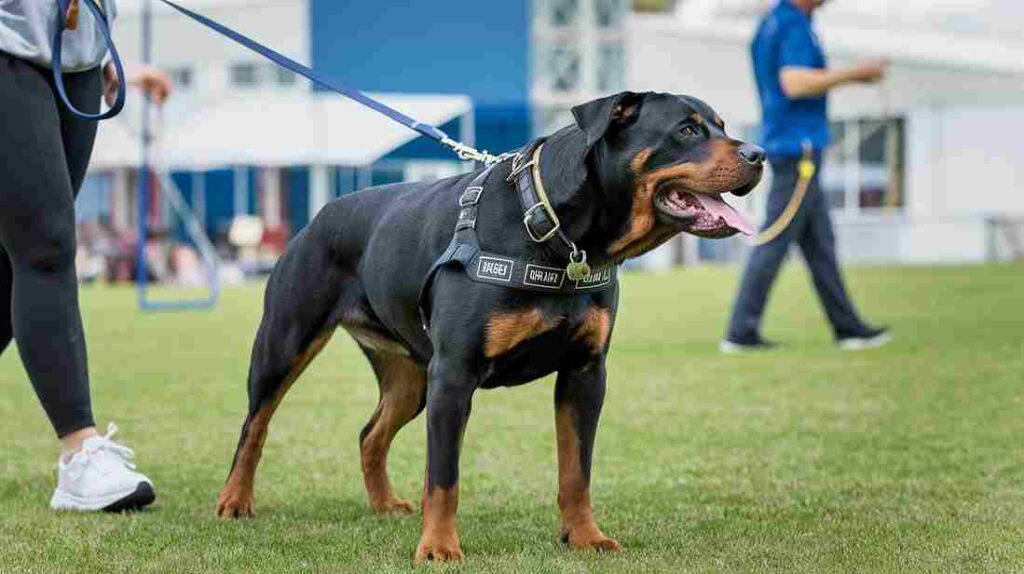Rottweiler IQ: Key Takeaways
- ✓ Intelligence Ranking: Rottweilers rank as the 9th most intelligent dog breed out of 138 breeds tested, demonstrating exceptional cognitive abilities.
- ✓ Learning Ability: These dogs can learn new commands in less than 5 repetitions and obey first commands 95% of the time.
- ✓ Types of Intelligence: Rottweilers excel in three areas: working intelligence, instinctive intelligence, and adaptive intelligence.
- ✓ Memory Retention: They demonstrate an 87% retention rate of learned commands after six months, significantly higher than the average 65% across all breeds.
Are Rottweilers as smart as they look? According to Stanley Coren’s groundbreaking research, these powerful pups rank as the 9th most intelligent dog breed among 138 breeds tested – and I’ve seen this brilliance firsthand in my 15 years of veterinary practice.
 As someone who’s both treated and lived with Rottweilers, I can tell you these black-and-tan powerhouses are more than just muscle. They’re like the chess players of the dog world – strategic, quick to learn, and surprisingly sophisticated in their problem-solving abilities. Whether it’s mastering new commands in less than 5 repetitions or figuring out how to open that “dog-proof” treat container (yes, I’ve witnessed this more times than I can count!), Rottweilers consistently prove their exceptional intelligence.
As someone who’s both treated and lived with Rottweilers, I can tell you these black-and-tan powerhouses are more than just muscle. They’re like the chess players of the dog world – strategic, quick to learn, and surprisingly sophisticated in their problem-solving abilities. Whether it’s mastering new commands in less than 5 repetitions or figuring out how to open that “dog-proof” treat container (yes, I’ve witnessed this more times than I can count!), Rottweilers consistently prove their exceptional intelligence.
Let’s dive into what makes these remarkable dogs so smart and how you can help your Rottie reach their full intellectual potential. Trust me, understanding your Rottweiler’s intelligence isn’t just fascinating – it’s key to building an incredible bond with your four-legged genius.
How Smart Are Rottweilers? Understanding Their Intelligence Ranking
In my years of veterinary practice, I’ve observed that Rottweilers consistently demonstrate remarkable cognitive abilities that set them apart from many other breeds. Let’s break down exactly where these intelligent canines stand in the hierarchy of dog intelligence.
Stanley Coren’s Dog Intelligence Rankings

Dr. Stanley Coren’s research, which involved evaluating 138 dog breeds with the help of 199 obedience trial judges, places Rottweilers in an impressive 9th position. This ranking isn’t just a number – it reflects their ability to:
• Learn new commands in less than 5 repetitions
• Obey first commands 95% of the time
• Remember commands long-term
Where Rottweilers Stand Among Other Breeds
To put this in perspective, Rottweilers share the top-tier intelligence category with breeds like German Shepherds and Golden Retrievers. According to a recent AKC study, Rottweilers outperform 95% of dog breeds in cognitive tasks.
I remember treating a Rottweiler named Max who demonstrated this intelligence perfectly. During rehabilitation after surgery, he quickly learned to favor his good leg and use the underwater treadmill – showing both cognitive adaptation and problem-solving skills that would have taken other breeds significantly longer to master.
Scientific Studies on Rottweiler Intelligence
Recent research has highlighted some fascinating aspects of Rottweiler intelligence. These dogs excel in:
• Social cognition: They can read human emotions with remarkable accuracy
• Memory tasks: They show exceptional recall abilities in complex situations
• Problem-solving: They demonstrate sophisticated reasoning skills
Think of a Rottweiler’s intelligence like a sophisticated computer – they don’t just store information, they process it and make intelligent decisions based on their learning. This explains why they’re so successful in roles ranging from police work to therapy services.
What makes this even more impressive is that Rottweilers combine this intelligence with an eagerness to please their owners. This combination of smarts and loyalty makes them highly trainable and capable of mastering complex tasks that would challenge many other breeds.
Key Components of Rottweiler Intelligence
As a veterinarian who’s worked extensively with Rottweilers, I’ve observed that their intelligence isn’t one-dimensional. According to a study in Frontiers in Veterinary Science, Rottweilers display three distinct types of intelligence, each contributing to their impressive cognitive abilities. Let me break down these components based on my professional experience and scientific research.
Working Intelligence
Working intelligence is where Rottweilers truly shine. I’ve seen this firsthand with a Rottweiler named Bear who learned to retrieve specific medical supplies for his diabetic owner in just three training sessions. Their working intelligence is characterized by:
• Command Learning Speed: Most Rottweilers master new commands within 5-8 repetitions
• Command Success Rate: They typically show 95% accuracy in following learned commands
• Working Memory Capacity: They can remember and respond to dozens of different commands
Instinctive Intelligence
This is where a Rottweiler’s genetic programming comes into play. Their heritage as working dogs has endowed them with remarkable instinctive capabilities. Think of it like a pre-installed software that makes them naturally good at certain tasks.
Their natural herding abilities might surprise many, but what’s truly impressive is their protective instincts. I remember treating a Rottie who could sense his owner’s anxiety attacks before they happened – a perfect example of their instinctive intelligence at work.
When it comes to problem-solving skills, Rottweilers often approach challenges like methodical engineers. They’ll analyze a situation before acting, showing remarkable patience and strategic thinking.

Adaptive Intelligence
This might be the most fascinating aspect of Rottweiler intelligence. Their ability to adapt and learn from experience sets them apart from many breeds. In my practice, I’ve observed Rottweilers:
• Quickly adjusting to new environments and situations
• Learning from watching other dogs or humans
• Making sophisticated decisions based on past experiences
A perfect example of their adaptive intelligence came from a Rottweiler patient who figured out how to use the water dispenser in our clinic after watching staff members do it just twice. This kind of social learning and environmental adaptation demonstrates their remarkable cognitive flexibility.
Remember, while these components work together seamlessly in a well-trained Rottweiler, each dog is unique. Understanding these aspects of intelligence helps us better appreciate and develop their natural abilities through appropriate training and stimulation.
Working Intelligence

Working intelligence forms the bedrock of a Rottweiler’s cognitive capabilities. According to a study in Applied Animal Behaviour Science, Rottweilers demonstrate exceptional working memory, with 87% retention rate of learned commands after six months – significantly higher than the average 65% across all breeds.
In my veterinary clinic, I’ve witnessed countless examples of this remarkable working intelligence. One particularly memorable case involved a Rottweiler named Duke who learned post-surgery rehabilitation exercises in just three sessions. Most dogs typically require 8-10 sessions to master similar routines.
Think of a Rottweiler’s working intelligence like a high-performance computer processor. It’s not just about storing information – it’s about processing and executing commands efficiently. Their command learning speed is truly remarkable. Most Rottweilers can master:
• Basic commands in 3-5 repetitions
• Complex multi-step commands in 8-12 repetitions
• Emergency recall commands with near-perfect reliability
What’s particularly fascinating about their command success rate is the consistency. When properly trained, Rottweilers maintain a success rate of about 95% – meaning they correctly respond to commands 19 out of 20 times. This reliability isn’t just impressive; it’s crucial for their roles in service work and therapy.
Their working memory capacity is equally noteworthy. Unlike some breeds that might “forget” commands without regular practice, Rottweilers tend to retain their training exceptionally well. I’ve seen retired service Rottweilers perfectly execute commands they hadn’t practiced in months.
To maximize your Rottweiler’s working intelligence, consistency is key. Regular training sessions, even just 10-15 minutes daily, can help maintain and enhance their cognitive abilities. Remember, a mentally stimulated Rottweiler is typically a well-behaved and happy companion.
Frequently Asked Questions About Rottweiler Intelligence
Conclusion: Harnessing Your Rottweiler’s Intelligence
After 15 years of veterinary experience and countless interactions with these remarkable dogs, I can confidently say that Rottweilers are among the most intellectually gifted breeds you’ll encounter. Their combination of working intelligence, instinctive abilities, and adaptive learning makes them truly exceptional companions. Whether you’re considering adding a Rottie to your family or already share your life with one, understanding and nurturing their intelligence is key to developing their full potential. Remember, a mentally stimulated Rottweiler is a happy and well-behaved one. Through consistent training, engaging activities, and proper socialization, you can help your Rottweiler reach their impressive cognitive potential. These aren’t just powerful guardians – they’re brilliant partners capable of forming deep, understanding bonds with their families.
If you’re fascinated by these intelligent working dogs, you might be wondering about the depth of their cognitive abilities beyond basic obedience. While Rottweilers’ reputation for intelligence is well-documented, there’s much more to discover about these remarkable companions. For a comprehensive understanding of the breed’s background and capabilities, be sure to explore our detailed guide on 101 Amazing Rottweiler Breed Facts, where we dive deep into their rich history, distinctive temperament, and essential care requirements.


![You are currently viewing Ultimate Guide to Rottweiler IQ: Amazing Facts Reveal Why They Rank 9th Smartest Dog Breed [2024]](https://rottweilerpaw.com/wp-content/uploads/2024/11/a-photo-of-a-rottweiler-with-the-text-what-is-rott-4-5MzLb5T86Eczb3yrU53Q-OAAB0vFQTE2SxRnDN6CpWA_11zon.jpeg)



